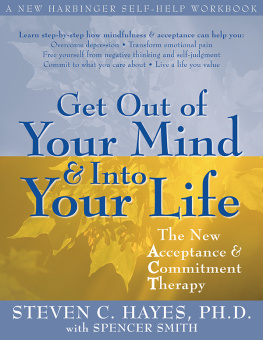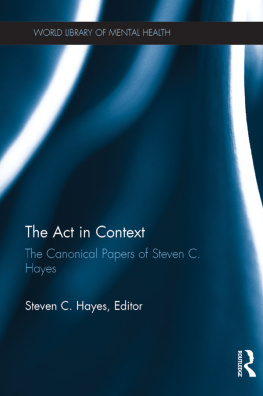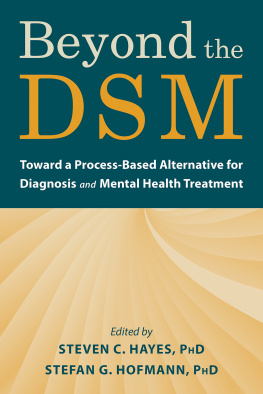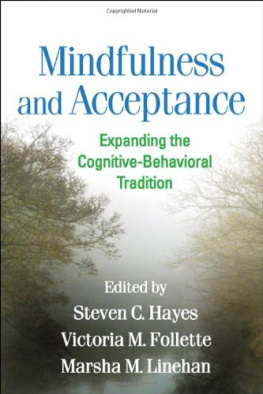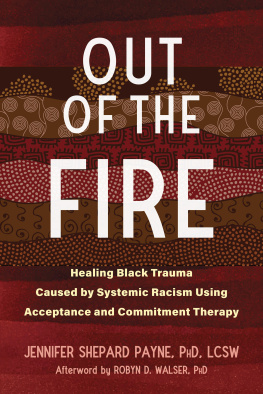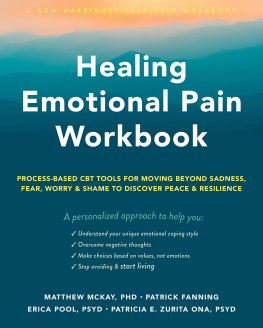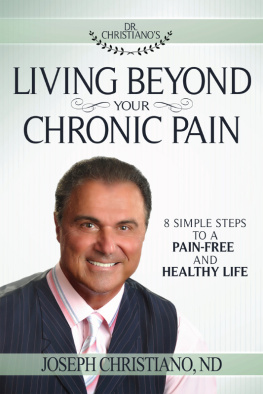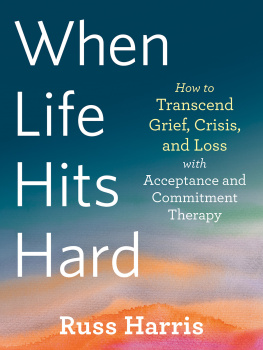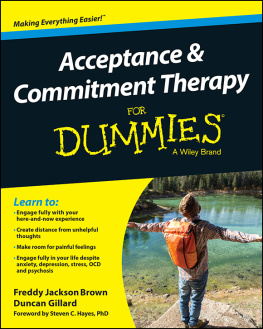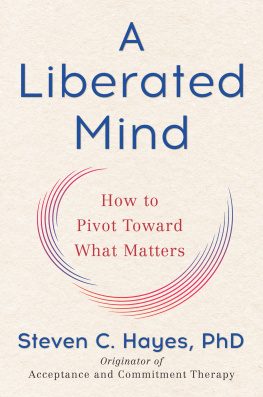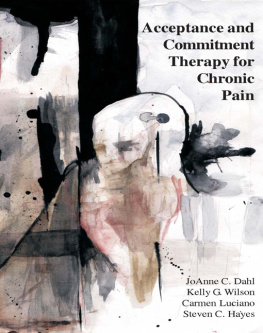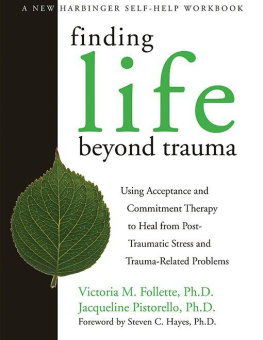Get Out of Your Mind and Into Your Life
With kindness, erudition, and humor, the authors of Get Out of Your Mind and Into Your Life educate readers into a new way of thinking about psychological issues in general and life satisfaction in particular. Their combination of cutting-edge research and resonance with ancient, tried-and-true practices makes this one of the most fascinating and illuminating self-help books available. If youre tired of standard psychological parlance and still frustrated with your quality of life, this book can be a godsend.
Martha Beck, columnist for O Magazine and author of Finding Your Own North Star and Expecting Adam
This manual, firmly based on cutting edge psychological science and theory, details an innovative and rapidly growing approach that can provide you with the power to transform your very experience of life. Highly recommended for all of us.
David H. Barlow, professor of psychology, research professor of psychiatry, and director of the Center for Anxiety and Related Disorders at Boston University
This is the quintessential workbook on acceptance and commitment therapy. Written with wit, clinical wisdom, and compassionate skepticism, it succeeds in showing us that, paradoxically, there is great therapeutic value in going out of our minds. Once released from the struggle with thought, we are free to discover that a life of meaning and value is closer at hand than thought allowed. This book will serve patients, therapists, researchers, and educators looking for an elegant exposition of the nuts and bolts of this exciting approach.
Zindel V. Segal, Ph.D., the Morgan Firestone Chair in Psychotherapy and professor of psychiatry and psychology at the University of Toronto and author of Mindfulness-Based Cognitive Therapy for Depression
Get Out of Your Mind and Into Your Life
Steven Hayes & Spencer Smith
New Harbinger Publications
Publishers Note
This publication is designed to provide accurate and authoritative information in regard to the subject matter covered. It is sold with the understanding that the publisher is not engaged in rendering psychological, financial, legal, or other professional services. If expert assistance or counseling is needed, the services of a competent professional should be sought.
Distributed in Canada by Raincoast Books.
Copyright 2005 by Steven C. Hayes and Spencer Smith New Harbinger Publications, Inc.
5674 Shattuck Avenue
Oakland, CA 94609
Cover design by Amy Shoup
Text design by Michele Waters-Kermes
Acquired by Catharine Sutker
New Harbinger Publications Web site address: www.newharbinger.com
Library of Congress Cataloging-in-Publication Data
Hayes, Steven C.
Get out of your mind and into your life: the new acceptance and commitment therapy / Steven Hayes & Spencer Smith.
p. cm.
Includes bibliographical references.
ISBN 1-57224-425-9
1. Cognitive-experiential psychotherapy. 2. Behavior therapy. 3. Self-acceptance. 4. Commitment (Psychology) I. Smith, Spencer Xavier. II. Title.
RC489.C62H395 2005
616.89142dc22
2005022640
All Rights Reserved
First printing
To my mom
Ruth D. H. Sundgren
My first model of love and commitment
SCH
To my wife and son
Together may we accept lifes trials and commit to our mutual path
SS
Contents
Chapter 1
Chapter 2
Chapter 3
Chapter 4
Chapter 5
Chapter 6
Chapter 7
Chapter 8
Chapter 9
Chapter 10
Chapter 11
Chapter 12
Chapter 13
Conclusion
Appendix
I would like to thank a number of people who have contributed to this volume. My wife, Jacque Pistorello, was constantly supportive and inspirational during the writing of the book. My children, Camille, Charlie, and Esther, were understanding when I had to focus on the book and not them for a few critical weeks. Like Jacque, Spencer Smiths wife, Marie, also supported us during our writing binges.
Many of the ideas in this book have been influenced by members of the ACT Listserv. One, David Chantry, is listed as a chapter coauthor because he contributed so many different ideas, some of which went beyond that chapter (e.g., a variant of the Coping Strategies Diary; the railroad bridge exercise; the empty head exercise; the valued living recording sheet). I thank him for his permission to use these ideas in the book. My students (several of whom provided materials that found their way into specific chapters and are listed as chapter coauthors) were a source of ideas and support throughout. The idea for a book that could be used directly by the public was first proposed to me by Don Kuhl of The Change Companies. The project did not reach fruition, but I would nevertheless like to acknowledge his role in getting me to think about such a project. Kirk Strosahl has prodded me periodically for years to do a popular book, which also had a role in my willingness to do this work. New Harbinger, particularly Matt McKay and Catharine Sutker, allowed me the freedom to approach the book in my own way.
ACT and RFT are collective, not personal, works that have been influenced by the hands of many: students, colleagues, and clients. I cannot thank them all in this forum, but I surely do in my head and heart. You know who you are. Thank you.
Steven C. Hayes
Reno, NV
May 2005
First and foremost I would like to thank Steve Hayes for inviting me on board to help him create a trade version of this work. It has been a pleasure working with him. I believe the work on this book has affected my life in some very direct ways, and I am thankful for that opportunity.
I would also like to thank his various family members who showed me much hospitality on trips to Reno when we were writing the book.
My wife, Marie, has been patient and helpful in supporting me throughout this process. Aside from giving me the space to work on this project, she also took on the burden of staying up nights with our newborn son, Tristan, on her own so that I could get the extra sleep needed to keep working.
Thank you to the people at New Harbinger who made my involvement with this project possible. I would especially like to thank Catharine Sutker, who introduced me to the project, and Matthew McKay, our publisher, in this regard. It has been and continues to be a pleasure to work with you.
Finally I would like to thank you the reader. I hope our efforts in presenting this material will impact your life in some positive ways.
Spencer Smith
Santa Rosa, CA
May 2005
People suffer. Its not just that they have painsuffering is much more than that. Human beings struggle with the forms of psychological pain they have: their difficult emotions and thoughts, their unpleasant memories, and their unwanted urges and sensations. They think about them, worry about them, resent them, anticipate and dread them.
At the same time, human beings demonstrate enormous courage, deep compassion, and a remarkable ability to move ahead even with the most difficult personal histories. Knowing they can be hurt, humans still love others. Knowing they will die, humans still care about the future. Facing the draw of meaninglessness, humans still embrace ideals. At times, humans are fully alive, present, and committed.
This book is about how to move from suffering to engagement with life. Rather than waiting to win the internal struggle with your own self so that your life can begin, this book is about living now and living fullywith (not in spite of) your past, with your memories, with your fears, and with your sadness.
This book is based on Acceptance and Commitment Therapy, or ACT. (ACT is spoken as a single word, not as separate initials.) This is a new, scientifically based psychotherapeutic modality that is part of what is being called the third wave in behavioral and cognitive therapy (Hayes 2004). ACT is based on Relational Frame Theory (RFT): a basic research program on how the human mind works (Hayes, Barnes-Holmes, and Roche 2001). This research suggests that many of the tools we use to solve problems lead us into the traps that create suffering. To put it bluntly, human beings are playing a rigged game in which the human mind itself, a wonderful tool for mastering the environment, has been turned on its host.

